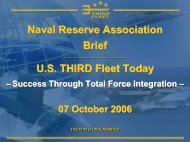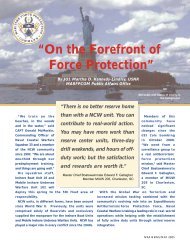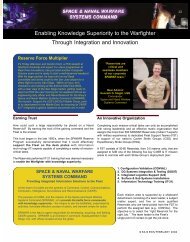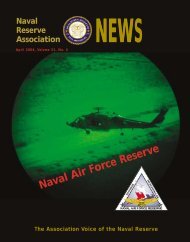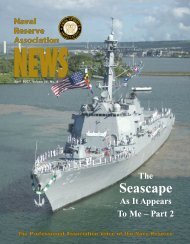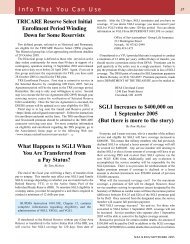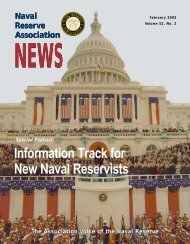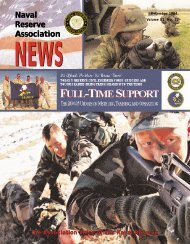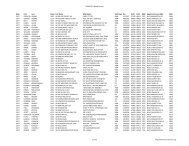Naval Reserve Association
Naval Reserve Association
Naval Reserve Association
Create successful ePaper yourself
Turn your PDF publications into a flip-book with our unique Google optimized e-Paper software.
Junior Officer Country11Lessons Learned fromAPPLY 06 – Part 2CDR Phan Phan, USNNational VP for Junior OfficersAs mentioned in last month’s issue, this articlewill cover the second half of the APPLY boardprocess, slating. I’ve collected the followingnotes & observations from serving as anassistant recorder on the O-5 Line Panel.There were many other panels (O-4/O-6 Line,Medical, Chaplain, Medical, Intel, METOC,etc.) with their own particulars, but the generalslating process remained the same.After the first week or so of recordsreview, briefing, and voting onconfidence factors of thousandsof records, the APPLY board spent thesecond week assigning officers to billetsaccording to their “dream sheets,” competitiveranking, technical qualifications, supportedcommand's requirements, and others. Onthe O-5 panel, there were roughly 580 billetsto be slated from a pool of about 2,000applicants. A very conscientious effort wasmaintained by the board to deliberate thisas a slating process and not a detailingprocess. During this second half, what theboard saw included: (a) applicant’sremarks, billets history, and dream sheetfrom the APPLY Web site; (b) education;(c) last four reserve NOBCs; (d) AQDs;(e) any résumé submitted; (f) level ofsecurity clearance; and last, but not least,(g) confidence factor from the first week.1. If one notices any degree or NOBCmissing from one’s OSR, be sure to mentionthem in the remarks section as well assending in any documentation of proof.Any information entered in the remarks/comments section should be of short,concise, and relevant bullets. If your currentbillet is going away, with tenure remaining,due to ZBR draw down or whatever reason,so articulate. However, the textbox onlyallow for so many characters, use the limitedreal estate wisely. Don’t waste valuable“advertising” space with wordy narrative.Imagine your attention span while travelingat 65 MPH on the freeway, trying tocatch a billboard.2. If applying for a billet within a programrequiring a résumé, such as Programs 18(SPACE & NETWAR) or 38 (ONR), dosubmit a thoughtfully crafted résumé.Relevant civilian experience counts!Otherwise, an applicant will be skippedover swiftly. Can one imagine respondingto a job advertisement in a local newspaper,a hiring company Web site, or eventhrough personal connection withoutsubmitting a résumé? Unthinkable in thecivilian world, but there were a fewinstances here.3. Look at the requirements of the billetsfor which one might want to apply two-tothreeyears down the road and do someadvanced planning for NOBC and securityclearance (especially at TS or SCI level)and work on them. These usually take timeand persistent effort to accomplish andmaintain, but will most probably make adifference between a pay billet and VTU.Consider them as long-term personalinvestment.4. Be sure to register with the APPLYWeb site every year, even if one mightnot be applying for a billet. Update orvalidate one's PRD and billets history.It’s much easier to maintain your profileincrementally. It could be a bit more difficulttrying to search through stacks of oldadmin documents, or to remember frommissing paperwork after several years.5. The O-5 panel consisted of fourRDMLs and about 23 senior O-5/O-6s.Every vote counted, and counted equally.Competition was extremely keen. Theboard made an exhaustive effort to fill allbillets but, in the end, there were stillabout a dozen or so O-5 billets left on thetable due to lack of qualified candidates(hard-coded designator/NOBC, securityclearance, technical qualifications, lowconfidence factor, etc.).6. As part of the process dynamics, therewere also O-5 billets that became availablein the last moment to be filled but, of course,had never been advertised by APPLY. Thesewere vacated, during the board process, byCAPT(S) applicants; or by CDRs who gotselected for command billets with tenurestill remaining in current non-commandbillets. Lesson learned: carefully weighyour desire to engage & willingness totravel (within 100 miles, at the very least),and to accept billets not on your dreamsheet. One could never know, that localbillet right across the drill hall might openup after all the dust has settled.For JOs, even though not being requiredto go through APPLY for a pay billet, it’svery important to avoid homesteading;i.e., staying in the same unit doing thesame job for five-to-six years withoutmoving up in leadership responsibility. Ifyou’ve been moving up from Dept. Head,to XO, and then perhaps to CO in the sameunit, that’s great. But if you’ve evidently“maxed out,” and an appropriate opportunitypresents itself with another unit, or even adifferent designator, for which you canqualify, seriously consider it. For noncommandjobs, the billeting process forJOs can be accomplished via your localNRA’s Manpower. Your CO/XO, recruiters,and officer community leaders are also goodsources of information and guidance.Certainly, register with APPLY every yearand review the billets database to see whatkinds of CO jobs are available out there. Itis also worthwhile to look at some seniorbillets, just to get some ideas to prepareyourself a little bit further down the road.The need of the Navy is ever changing,keep your eyes open and your ears close tothe ground. Think ahead; plan ahead.NRA NEWS/SEPTEMBER 2005




